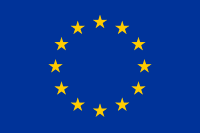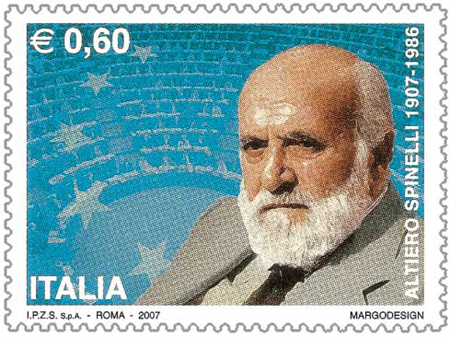Congress of European people
 |

|
| Title: | Congress of European People |
| International Organization: | European Union |
| Active: | No |
| From: To: | 1956 - 1962 |
| Promoters: | Union of European Federalists |
| Supporters: | 638,114 votes in seven countries |
| Aim: | A European constituent assembly |
The campaigns' objectives
The Congress of the European People (1956-1962) was a great popular campaign calling for a European constituent assembly to be directly elected by the citizens and mandated to draw up a draft federal constitution which would then be submitted for ratification by means of a European-wide referendum. It would come into force after approval by a majority of ratifying countries.  The basic instrument devised by Altiero Spinelli, the founder of Movimento Federalista Europeo in 1943, to pursue that goal was the Congress of the European People on the model of Gandhi's Indian National Congress. Following the American model primary elections would be organised in several European cities, thus giving birth to a permanent congress of representatives of the European people which, by extending its footprint to become ever more truly representative, could then force the governments to convene a federal constituent assembly.
The basic instrument devised by Altiero Spinelli, the founder of Movimento Federalista Europeo in 1943, to pursue that goal was the Congress of the European People on the model of Gandhi's Indian National Congress. Following the American model primary elections would be organised in several European cities, thus giving birth to a permanent congress of representatives of the European people which, by extending its footprint to become ever more truly representative, could then force the governments to convene a federal constituent assembly.
History
It all began with the Stresa convention held in July 1956, where for three weeks, under the leadership of Alberto Cabella, secretary of the preparatory committee of the CEP, political and organisational training sessions were held for the militants involved in organising the first primaries elections and where the fundamental documents that were to constitute the basis of the operation were ratified. As well as a political declaration that summarized the crucial theses fo the new direction, an action plan was approved that foresaw in particular, on the part of the study groups formed by social and local groups attracted by the federalist campaign, the drafting of "document of protest and reclamation" of the Europeans to be presented to the CEP. It was an idea conceived by Spinelli which was based on the precedent of the "cahiers de doleance" drafted in 1789 in view of the convocations of the General States which would proceed to pave the way for the French revolution. The documents of protest and reclamation would essentially have to give a voice to the legitimate aspirations of the European people, identifying the political, economic and social problems as they were perceived by the various groups constituting European society and which would find a solution in a European federation. It was therefore important to find a balance between general and specific reclamations so that the documents could represent the European people in its essential unity and in its legitimate peculiarities.
The Plan
During the Stresa convention in 1956 a plan was drafted. It implied organization of militant groups in several cities, presentation of the campaign in different social enviroments, publication of a single European newspaper in four languages; and therefore the calling of assemblies to designates to the first CEP, primary elections of the delegates and finally the session of the Congress. In november 1957, the first elections were held in eight European cities, gathering 240 delegates in Turin. New elections brought about the convocation of other four Congresses.
The results
The organisation of the elections of the delegates of the CEP began in the autumn of 1957, starting with Turin, Ivrea, Galliate, Trecate, Pinerolo, Milan, Como, Strasbourg (and about 50 small boroughs in Alsace), Lyon, Antwerpern, Dusseldorf, Maastricht and Geneva. The electoral operations - carried out according procedures which prevented double voting and guaranted the secrecy of the vote - where periodically repeated, increasing the number of town and cities involved, until 1962. In total, 638,114 votes were collected in seven countries - Germany, Austria (where the elections continued until 1964), Belgium, France, Italy, the Netherlands, Switzerland - of which 455,214 came from Italy. The poor results obtained outside Italy were, together with the political evolution, a fundamental reason for the ultimate failure of the campaign.
Election results:
| Delegations | Electors | Delegates |
|---|---|---|
| Antwerpen-Maastricht | 66003 (*) | 32 (+ 30 not re-elected) |
| Bologna-Ferrara-Rovigo | 42997 | 24 |
| Bruxelles-St. Josse | 1806 | 5 |
| Capua-Napoli | 7571 | 11 |
| Darmstadt | 25826 | 21 |
| Dusseldorf | 3432 | (+ 30 not re-elected) |
| Feldbach-Neumarkt-Hartberg | 7133 | 15 |
| Firenze-Massa | 10973 | 12 |
| Frankfurt-Gross Gerau | 2661 | 11 |
| Furstenfeld | 3586 | 5 |
| Genève | 1552 | (+ 30 not re-elected) |
| Genova-La Spezia | 50650 (*) | 33 (+ 20 not re-elected) |
| Lyon-Annecy | 20197 (*) | 22 (+ 30 not re-elected) |
| Milano-Ticino | 146591 (*) | 52 (+ 30 not re-elected) |
| Mons-St. Ghislain | 3934 | 17 |
| Mulhouse | 13133 | 9 |
| Nancy | 879 | 5 |
| Oostende | 2839 | 10 |
| Roma | 117180 | 38 |
| Strasbourg | 27001 | (+ 30 not re-elected) |
| Torino-Cuneo | 37231 (*) | 24 |
| Udine | 23378 | 5 |
| Vernon | 2948 | 5 |
| Vicenza | 18643 | 9 |
|
|
|
|
|
| 638114 | 365 (**) |
* regions where election where held twice
** In total, those elected to the CEP, taking into account the rotation of the delegates, were 611.
Source:
Sergio Pistone, The Union of European Federalists, Giuffrè Editore, 2008
Cinzia Rognoni Vercelli, THe Congress of the European people, in Sergio Pistone (a cura di), I movimenti per l'unità europea, 1954-1969
